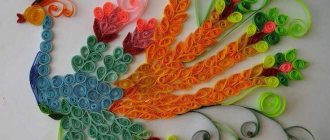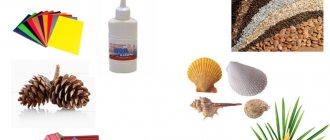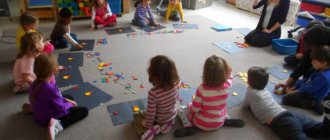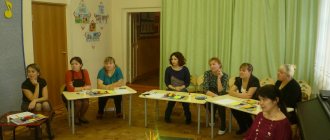Step-by-step instructions for drawing the selected plot
Summary of a drawing lesson on the topic “Butterfly”. Children continue to get acquainted with non-traditional drawing techniques. Children must learn how to create a drawing using the monotype technique, and also independently choose the color scheme of paints that matches the joyful summer mood.
Selected scene
Note! Develops color perception and improves fine motor skills of fingers and hands.
Materials and equipment:
- images with butterflies,
- paper folded in half,
- gouache,
- tassel,
- container with water,
- palette,
- cloth
Drawing technique in the preparatory group according to the Federal State Educational Standard
The main principle of teaching children of any age to draw is clarity: the child must know, see, feel the object or phenomenon that he is going to depict. Children should have clear, precise ideas about objects and phenomena. There are many visual aids used in drawing classes. All of them are accompanied by verbal explanations.
Method of art
When thinking through exercises, as well as a system of tasks aimed at developing visual skills, you should remember that literal repetition of the same tasks is boring for children. This process does not lead to success. For example, when drawing on the topics “Where the birds will winter,” “Fairy-tale trees,” “Trees on our site,” “Autumn square,” “Winter forest,” a preschooler depicts trees, conveying parts, structure, and solves composition problems.
Options for individual and collective drawings in different techniques (including non-traditional)
The use of paintings in classes in the preparatory group not only helps the teacher in clarifying children’s ideas about a particular subject, but also introduces them to some visual techniques. For example, a girl is playing with a ball - her hands are drawn up.
Sometimes a picture can be used in the drawing process when a child has forgotten the shape of some part or the details of an object; after examining it, the teacher removes it to prevent children from copying it. The picture, like the teacher’s drawing that replaces it, cannot serve as a model for a child’s drawing and cannot be used for copying.
Important! The perception of the picture should be based on observations in life, helping the child to realize what he saw.
Thematic planning on the topic “Modeling”
PERSPECTIVE PLAN FOR MOLDING
SENIOR GROUP
T.S. Komarova “Lessons in visual arts in the senior group”
I.A. Lykova “Art activities in kindergarten. Senior group"
L.V. Serov “The Colorful World of Belogorye”
SEPTEMBER
GOALS
LITERATURE
1
Modeling object “Our favorite toys”
Learn to sculpt toys, conveying their appearance. Learn to plan work - select the required amount of material, determine the method of sculpting
Lykova “Art activities in kindergarten. Senior group”, p. 22
2
Modeling from plasticine
“ Mushrooms ”
Strengthen the ability to sculpt objects or their parts, using the movements of the fingers and the entire hand. Learn to convey the features of a species.
Komarova “Classes in visual arts. Senior group." ,p.34
OCTOBER
GOALS
LITERATURE
1
Modeling based on the Dymkovo toy “Goat”
Continue to teach how to sculpt a figure based on folk motifs; use the technique of rolling out a column, bending it and cutting it in a stack at both ends.
Komarova, s. 46
3
Modeling from plasticine “How little Mishutka saw that everything in his bowl had been eaten”
Learn to create a fairy-tale image in sculpting. Learn to sculpt the figure of a bear cub, conveying the shape of the parts, their relative size, location in relation to each other. Lead to an expressive image. Fairy tale character.
Komarova, s. 45
NOVEMBER
GOALS
LITERATURE
1
Decorative relief sculpture “Leaves dance and turn into trees”
Introduce the technique of relief modeling. Develop a sense of shape and color.
Lykova, s. 46
2
Modeling from plasticine
“ Oleshek ”
Learn to sculpt a figure from a whole piece, conveying the shape of individual parts by stretching.
Komarova, s. 56
DECEMBER
GOALS
LITERATURE
1
Modeling from plasticine
“ Kitten ”
Learn to create the image of an animal in modeling. Strengthen the ability to sculpt in parts, using different techniques. Convey the animal's pose.
Komarova, s. 63
2
Modeling from plasticine “Girl in a winter coat”
Learn to sculpt a human figure, conveying the shape of clothing, body parts: observing proportions.
Komarova, s. 67
JANUARY
GOALS
LITERATURE
1
Modeling plot
“ Winter fun ”
Learn to create a collective composition from sculpted human figures. Fix the method of sculpting from a cylinder, cut at both ends.
Lykova, s. 114
2
Modeling from plasticine with a used syringe “Sheep”
learn to sculpt the silhouette of an animal using the “sausage” technique, make wool by squeezing plasticine from a syringe.
abstract
FEBRUARY
GOALS
LITERATURE
1
Modeling story “Dog with a puppy”
Fix the method of sculpting from a cylinder. Create a simple composition yourself, correlate the parts by size.
Lykova, s. 28
2
Modeling from plasticine “Tank”
Learn how to sculpt a tank from individual parts, correctly developing their shape and proportions. Continue to connect the parts, connect them tightly using the smear method
abstract
MARCH
GOALS
LITERATURE
1
Modeling from plasticine “Birds at the feeder”
Develop perceptions, the ability to highlight the various properties of birds; compare birds. Learn to sculpt birds in parts, conveying the size of the body and head.
Komarova, s. 92
2
Decorative relief molding “Sunshine, show yourself!”
Continue mastering the terrain. Show ray image options. Learn to create solar images.
Lykova, s. 148
APRIL
GOALS
LITERATURE
1
Modeling from plasticine
“ Cup ”
Learn to sculpt a cup consisting of rings and a disk, firmly connect the parts of the product to each other, smooth the surface
Abstract
3
Modeling from salt dough “Ringing bells”
Creation of volumetric hollow crafts from salt dough and decorative design according to plan
Lykova, s. 104
MAY
GOALS
LITERATURE
1
Collective story sculpting “We went to the meadow, we sculpted the meadow”
Learn to sculpt your choice of meadow plants and insects, conveying their structure and color; giving stability.
Lykova, s. 200
2
Modeling from plasticine in combination with additional material
“Meadow Wreath of the Belgorod Region”
Consolidate knowledge about flowers, about the summer season; To introduce the elements of the “milefiori” technique when creating a composition; Develop skills in working with the stack; Improve plate twisting techniques; Develop a sense of color and rhythm; collective spirit when creating a common composition; Foster a love for living nature.
Serov, 107
Conducting an educational activity on drawing on a chosen topic with children 6–7 years old
The object of the study is the process of drawing expressive images by children of senior preschool age using non-traditional techniques.
Subject of research: pedagogical possibilities of non-traditional techniques and materials in the development of expressive images in the drawings of children of senior preschool age.
Tasks:
- Study psychological and pedagogical literature and literature on the visual activities of children in a preschool institution;
- Make an analysis of the age characteristics of older preschoolers and the quality of children's drawings;
- Conduct research work on the quality of children's drawings using non-traditional techniques;
- Develop a development program for the development of creative abilities in art classes using non-traditional drawing techniques.
Carrying out educational activities with children 6-7 years old
A selection of demonstration materials for the conversation (photos and drawings)
Demonstration material is selected in accordance with the topic. The kindergarten teacher prepares illustrations from which new drawings, layouts, reproductions, subject or didactic pictures will be created. A perspective free plan helps children create expressive images.
Music and poetry appropriate to the topic of the lesson
To instill interest in artistic activity, the teacher must satisfy the needs of preschoolers. It is very important to select music according to the topic. For example, if a masterpiece is created on the theme “Winter”, then you need to choose the tunes “If only there were no winter”, “Three White Horses”, “New Year”, “Snow Maiden”. During the warm-up, you can read poetry, for example, “The bird that sings in the garden.”
Summary of a drawing lesson in the chosen technique in the preparatory group
Drawing in the preparatory group according to the Federal State Educational Standard is a unique way of understanding the world and developing knowledge of aesthetic education, since it is associated with the child’s independent practical and creative activity.
Systematic mastery of all necessary means and methods of activity provides children with the joy of creativity and their all-round development (aesthetic, intellectual, moral-labor, physical). It also allows us to fruitfully solve the problems of preparing children for school.
Examples of finished works
Children put their finished work on the table so that the teacher can evaluate their talent. Most often, children like to draw images on the theme “Defender of the Fatherland Day”, “March 8”, “Autumn”, “Spring has come”, “The coldest month”, “Profession”, “Forest”, “Why day follows night”, “Clothing” ", "Our kindergarten is like a home."
Works of preschoolers
The most popular theme for children is “Headdress”. The children learn to correctly name hats and their parts, telling what types they come in. For example, to come to the beach, you need to wear a Panama hat and a hat. When late autumn comes, women wear scarves and light scarves. And already in February and January you need to wear a warm pompom.
Patriotic education of preschool children



